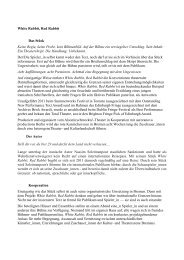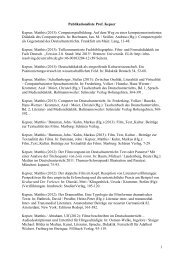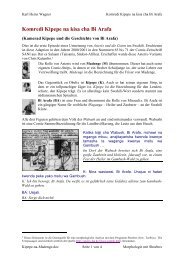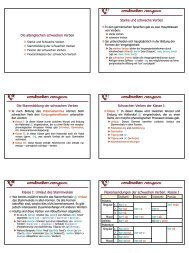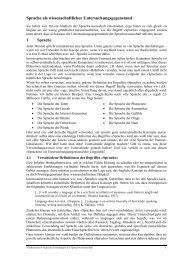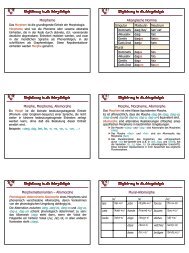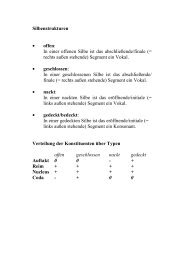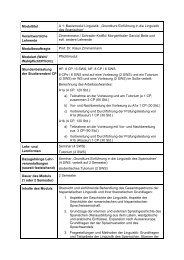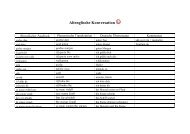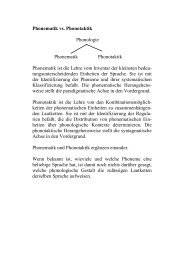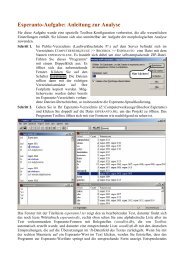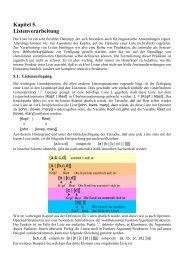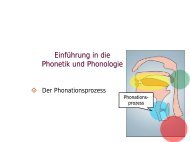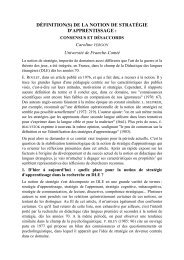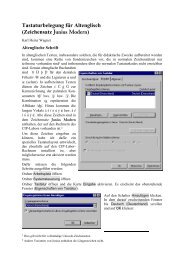Relativism and Universalism in Linguistics - Fachbereich 10 ...
Relativism and Universalism in Linguistics - Fachbereich 10 ...
Relativism and Universalism in Linguistics - Fachbereich 10 ...
You also want an ePaper? Increase the reach of your titles
YUMPU automatically turns print PDFs into web optimized ePapers that Google loves.
118 Sections<br />
Versprecherkorpora mehrerer Sprachen zeigen aber wesentliche Unterschiede <strong>in</strong> Proportionen<br />
ihrer Zusammenstellung.<br />
1. Die Erklärung hierfür liegt vor allem dar<strong>in</strong>, daß lexikalische E<strong>in</strong>heiten <strong>in</strong> e<strong>in</strong>zelner<br />
Sprachen unterschiedliche Häufigkeitswerte aufweisen.<br />
2. Es gibt aber auch Sprechfehler, die durch die typologische Aufbau der e<strong>in</strong>zelnen<br />
Sprachen bed<strong>in</strong>gt s<strong>in</strong>d. E<strong>in</strong> Beispiel: die Zeit- Raum-, Ursache-, Wirkung-Verhältnisse<br />
werden <strong>in</strong> den sog. flektierenden Sprachen durch vor den Nom<strong>in</strong>a stehende<br />
Propositionen, <strong>in</strong> den agglitunativen Sprachen durch an den Endungen der Nom<strong>in</strong>a<br />
auftretende Nachsilben ausgedrückt. Aufgrund dieser Differenz entstehen wesentliche<br />
Unterschiede <strong>in</strong> der Zusammenstellung der Versprecherkorpora flektierender vs.<br />
agglitunativer Sprachen.<br />
Es wird der Versuch unternommen, englischsprachige (Dell) und deutschsprachige Korpora<br />
(Berg, Jescheniak) mit den von dem Verfasser zusammengestellten ungarischsprachigen<br />
Korpora aus sprachtypologischer Sicht zu vergleichen.<br />
L<strong>in</strong>guistic evidence for speech act operators<br />
Seuren, Pieter A.M.<br />
Max Planck Institute for Psychol<strong>in</strong>guistics, Nijmegen<br />
Pieter.Seuren@mpi.nl<br />
A number of syntactic <strong>and</strong> lexical phenomena <strong>in</strong> different languages are discussed, which<br />
show that speech act operators have structural l<strong>in</strong>guistic reality. The arguments <strong>in</strong> Ross (1970)<br />
are discussed <strong>and</strong> judged to be <strong>in</strong>sufficient. It is shown that speech act operators occur not<br />
only at the top of a semantic analysis but may also occur further down the structure. The<br />
evidence adduced is derived from German, English, Turkish, Tibetan, Sabanê (an Amazonian<br />
language), <strong>and</strong> perhaps other languages as well. Epithet phenomena are <strong>in</strong>terpreted as<br />
evidence for underly<strong>in</strong>g speech acts of lexical choice ("I hereby call x a runt"). Cases of<br />
reference to speech acts ("Stop giggl<strong>in</strong>g, <strong>and</strong> I mean it!") are treated as evidence, as well as<br />
specific uses of propositional connectives ("H<strong>and</strong>s up or I'll shoot!").<br />
Reference:<br />
John R. Ross (1970) "On declarative sentences" In: R. Jacobs <strong>and</strong> P. Rosenbaum (eds),<br />
Read<strong>in</strong>gs <strong>in</strong> English Transformational Grammar. G<strong>in</strong>n & Co, Boston: 222–272.<br />
The concept of def<strong>in</strong>iteness<br />
Stroh-Woll<strong>in</strong>, Ulla<br />
Uppsala University, Sweden<br />
Ulla.Stroh-Woll<strong>in</strong>@Nordiska.UU.SE<br />
There is a very long debate about the mean<strong>in</strong>g of def<strong>in</strong>ite noun phrases. Key words <strong>in</strong> this<br />
debate are identifiability (or familiarity) <strong>and</strong> uniqueness. A term like identifiability is<br />
pr<strong>in</strong>cipally a pragmatic notion, whereas the proponents of the uniqueness description differ<br />
over whether uniqueness is part of the semantics of the phrase or derived pragmatically.<br />
As a grammarian, I have tackled the mean<strong>in</strong>g of def<strong>in</strong>iteness <strong>in</strong> a quite different way. The<br />
majority of def<strong>in</strong>ite noun phrases are used <strong>in</strong> contexts where both the identifiability description<br />
<strong>and</strong> the uniqueness description work. However, I do not believe neither identifiability,<br />
nor uniqueness to be grammatically encoded mean<strong>in</strong>gs of def<strong>in</strong>ite noun phrases, but (contextually,<br />
conventionally etc.) <strong>in</strong>terpretations with<strong>in</strong> the limits given by the encoded mean<strong>in</strong>g.



